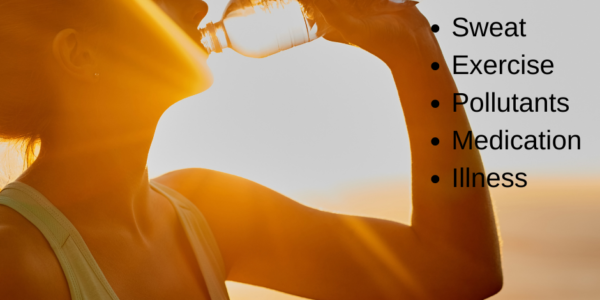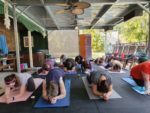
Just like our organs (including skin) and mind, muscle health is crucial for overall physical well-being and functionality. There are several factors that contribute to maintaining and improving muscle health, so if you are aiming to make sure your muscles are ‘firing on all cylinders’ consider the following.
Looking after our muscles is essential for maintaining overall health and well-being. Muscles play a crucial role in various bodily functions and activities, and taking care of them offers several benefits:
- Physical Strength and Functionality: Well-maintained muscles provide the strength and endurance needed for daily activities and physical tasks. Strong muscles make it easier to perform tasks like lifting, carrying, walking, and climbing stairs.
- Metabolism and Weight Management: Muscles are metabolically active tissues that burn calories even at rest. Building and maintaining muscle mass can help boost your metabolism, making it easier to manage your weight and prevent obesity.
- Bone Health: Muscles are connected to bones, and they help support and stabilize the skeletal system. Regular muscle engagement through activities like weight-bearing exercises can improve bone density and reduce the risk of conditions like osteoporosis.
- Joint Support: Strong muscles help support and protect the joints. Well-developed muscles can reduce the stress on joints and help prevent injuries and conditions like osteoarthritis.
- Posture and Balance: Muscles play a vital role in maintaining proper posture and balance. Strengthening core muscles and other muscle groups can improve your posture, reducing the risk of back pain and enhancing overall stability.
- Blood Sugar Regulation: Muscles assist in regulating blood sugar levels. Engaging in regular physical activity and maintaining muscle mass can contribute to better insulin sensitivity and glucose metabolism, reducing the risk of type 2 diabetes.
- Cardiovascular Health: Regular exercise, which involves muscle movement, improves cardiovascular health by increasing blood circulation, reducing blood pressure, and enhancing heart function.
- Mental Health: Engaging in physical activities that involve muscle movement can lead to the release of endorphins, which are “feel-good” hormones that can help alleviate stress, anxiety, and depression.
- Aging Gracefully: As we age, we naturally lose muscle mass and strength, which can lead to a decline in functional abilities. Regular exercise that targets muscle maintenance can slow down this muscle loss and help you maintain independence and vitality as you get older.
- Injury Prevention: Strong muscles offer better support to joints and ligaments, reducing the risk of injuries during physical activities or accidents.
To look after your muscles, consider incorporating:
- Regular Exercise: Engaging in regular physical activity, including both aerobic exercises (like walking, running, cycling) and resistance training (like weightlifting), is essential for building and maintaining muscle mass and strength.
- Protein Intake: Protein is a vital nutrient for muscle health as it provides the necessary building blocks (amino acids) for muscle tissue repair and growth. Including sources of lean protein in your diet, such as lean meats, poultry, fish, eggs, dairy products, legumes, and plant-based protein sources, is important.
- Adequate Nutrition: A balanced diet rich in essential nutrients, vitamins, and minerals is essential for overall health, including muscle health. Nutrients like vitamin D, calcium, magnesium, and potassium play roles in muscle contraction, energy metabolism, and overall muscle function.
- Hydration: Staying properly hydrated is important for maintaining muscle function and preventing cramps. Water helps transport nutrients to cells and aids in waste removal.
- Rest and Recovery: Giving your muscles sufficient time to recover after exercise is crucial. Sleep is particularly important, as it is during sleep that your body repairs and grows muscle tissue.
- Stretching and Flexibility: Incorporating regular stretching and flexibility exercises can help improve joint mobility, reduce the risk of injury, and promote overall muscle health. Massage and yoga are excellent to add into your regular routine.
- Avoiding Sedentary Lifestyle: Prolonged periods of inactivity can lead to muscle atrophy (loss of muscle mass and strength). It’s important to stay active throughout the day, even if you have a desk job.
- Balancing Stress: Chronic stress can lead to muscle tension and other negative impacts on your body. Practices such as massage, meditation, yoga, and deep breathing can help manage stress levels and promote muscle relaxation.
- Avoiding Smoking and Excessive Alcohol Consumption: Both smoking and excessive alcohol consumption can have negative effects on muscle health and overall physical well-being.
- Medical Conditions and Medications: Certain medical conditions (like diabetes, hormonal imbalances) and medications can impact muscle health. It’s important to manage any underlying health conditions and consult with healthcare professionals if necessary.
Remember that individual needs can vary based on factors such as age, gender, fitness goals, and existing health conditions. Consulting with a healthcare provider, fitness expert, or registered dietitian can provide personalised guidance for optimizing muscle health based on your specific circumstances.




